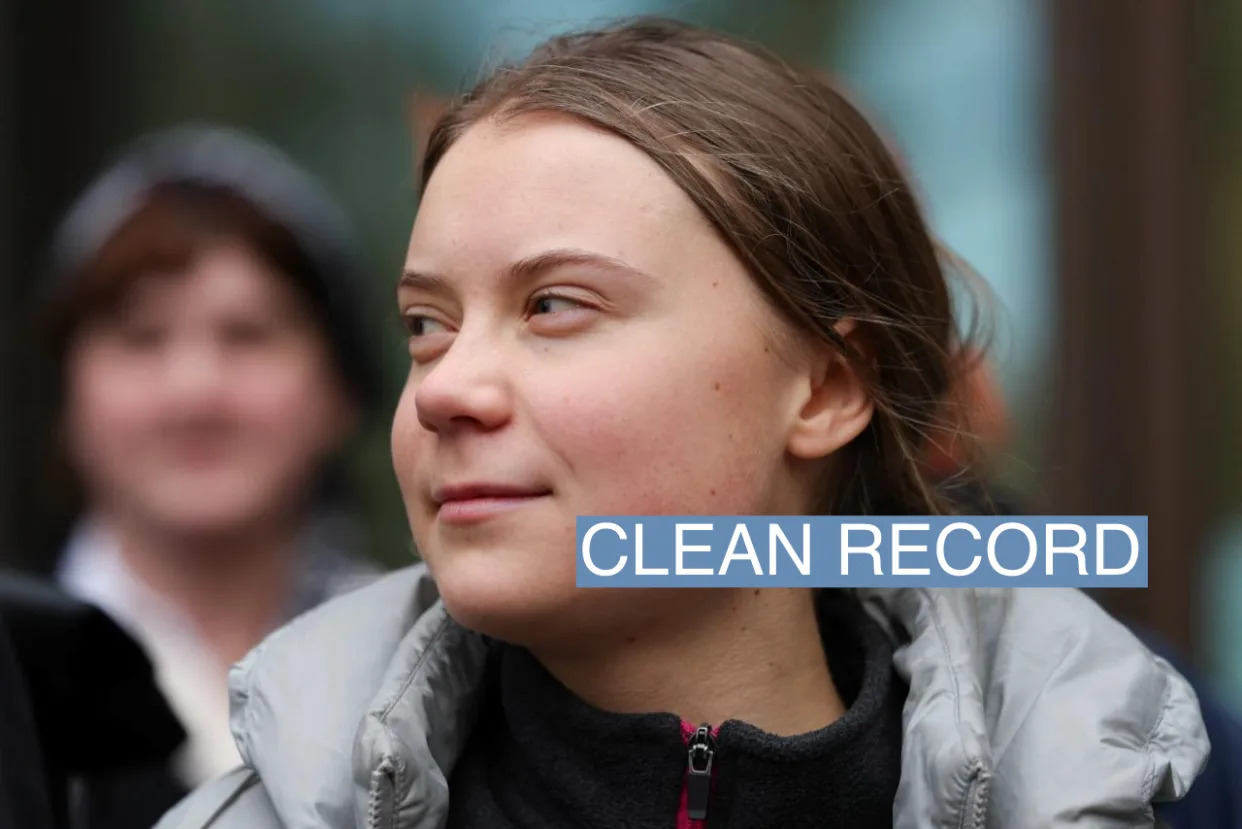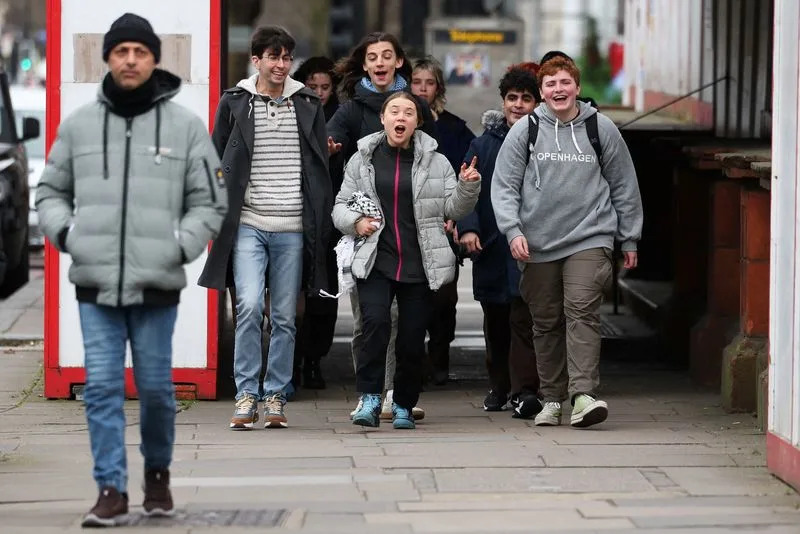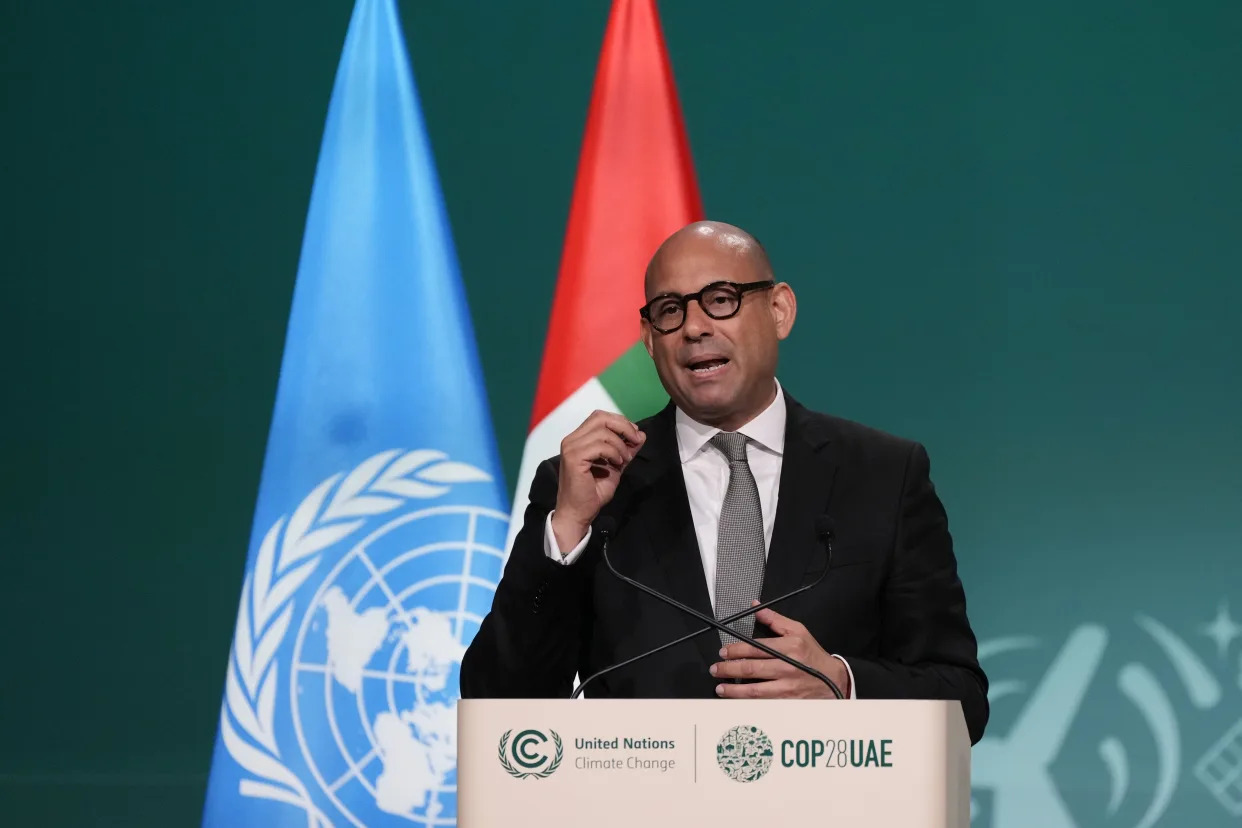BBC
Fri, February 2, 2024

Climate campaigner Greta Thunberg has defended climate activists facing prosecution in court, saying "we must remember who the real enemy is".
The 21-year-old was arrested during a demonstration near the InterContinental Hotel in Mayfair on 17 October.
Oil executives had been meeting inside for the Energy Intelligence Forum.
Ms Thunberg appeared at Westminster Magistrates' Court after previously denying breaching the Public Order Act 1986.
She is accused of breaching section 14 of the act by blocking the entrance to the hotel.
Ms Thunberg appeared at court along with two Fossil Free London protesters and two Greenpeace activists, who also pleaded not guilty to the same offence.
'Who real enemy is'
Outside court, Thunberg made a statement alongside some of her co-defendants in which she said: "Even though we are the ones standing here, climate, environmental and human rights activists all over the world are being prosecuted, sometimes convicted, and given... penalties for acting in line with science.
"We must remember who the real enemy is, what are we defending, who our laws are meant to protect."
She added: "History's judgement against those who deliberately destroy and sacrifice... resources at the expense of humanity, at the expense of all those who are suffering the consequences of the environmental and climate crisis... and at the expense of future generations, your own children and grandchildren will not be gentle."
Earlier, the court had heard that Greta Thunberg was given a "final warning" by police before she was arrested.
The court was told by Supt Andrew Cox, the most senior Metropolitan Police officer on the ground that day, that the protesters had refused to move despite repeated requests by police.
Demonstrators started to gather near the hotel at about 07:30 BST and police engaged with them about improving access for members of the public, which had been made "impossible", magistrates were told.
The court heard that as the protest continued the "majority" of people inside the hotel could not leave and people could not get inside.
Supt Cox told the court he had no choice but to impose a section 14 condition at about 12:30 BST, which directed that the protest could continue on the pavement to the south of the hotel.
Officers engaged with individual protesters and informed them of the section 14 condition, magistrates were told, including Ms Thunberg, who was standing outside the hotel entrance.
'She said she was staying'
Prosecutor Luke Staton said she was warned by one officer that her failure to comply would result in her arrest and, while that officer was engaged elsewhere, another officer spoke with Ms Thunberg and "gave her a final warning".
"She said that she was staying where she was, and so she was arrested," Mr Staton said.
The Swede continually made notes in a small notebook as proceedings went on.
Arriving at court earlier Ms Thunberg, the founder of the school strike for climate movement, walked past environmental protesters who were demonstrating "in solidarity" with the defendants.
They held up large yellow banners that read, "climate protest is not a crime" and cardboard signs saying, "who are the real criminals?", as well as placards.
Amnesty International UK's chief executive, Sacha Deshmukh, said Thunberg should be "applauded for her peaceful climate protests."
"The charges against Thunberg and all the activists highlight everything that's wrong with the policing of protests in the UK today," he said.
"Police are increasingly using their expanded powers to silence legitimate protests."
Greta Thunberg cleared of public order charge during London oil conference protest
Euronews Green
Thu, February 1, 2024

Greta Thunberg cleared of public order charge during London oil conference protest
Greta Thunberg has been cleared of a public order offence at a protest outside an oil and gas conference last year after a judge said she had no case to answer.
Judge John Law dismissed the public order charge against her and four others, ruling that the condition placed on the protest was "unlawful" because police could have imposed lesser restrictions and because the conditions were not clear.
The action in October was part of Oily Money Out - a series of disruptions against the carbon emissions, political influence and lobbying of the fossil fuel companies and banks attending the Energy Intelligence Forum by the group Fossil Free London.
The annual meeting of energy companies hosted executives of the biggest fossil fuel firms as well as politicians.

Environmental activists including Greta Thunberg, center left, march with other demonstrators during the Oily Money Out protest at Canary Wharf, in London.
The Swedish climate activist was detained while demonstrating with hundreds of other protesters outside the Energy Intelligence Forum, at the InterContinental London Park Lane Hotel in Mayfair. They attempted to block the entrance of the hotel before they were escorted away by police.
Five activists including Thunberg were accused of failing to comply with a condition imposed under section 14 of the Public Order Act after not moving to a designated area when told to by police.
The two activists from Greenpeace, two from Fossil Free London and Thunberg all pleaded not guilty at an initial hearing in November last year. Today all five were cleared of a public order offence at a court in London.
"The prosecution evidence is insufficient for any reasonable court to properly convict and I exercise my discretion to acquit all five defendants," Judge Law said.
Farnborough: Why did Greta Thunberg join hundreds of activists protesting an English airport?
Direct confrontation and larger gatherings: How German climate activism is set to evolve
"Even though we are the ones standing here ... climate, environmental and human rights activists all over the world are being prosecuted, sometimes convicted, and given legal penalties for acting in line with science," Thunberg told reporters outside the court before the first day of the trial on Thursday.
"We must remember who the real enemy is. What are we defending? Who are our laws meant to protect?”
UK 'crackdown' on climate protests
The arrests came amid a UK government crackdown on “disruptive” protests which saw the UN Special Rapporteur on environmental defenders criticise the country's “regressive new laws”.
Then-Home Secretary Suella Braverman made controversial changes to public order and policing legislation that expanded police powers to deal with the kind of protests favoured by climate activists.
Climate change kills millions: An expert explains why most deaths aren't attributed to the crisis
‘Be an actionist’: An environmental trailblazer’s inspiring message to climate activists from Davos
Greta Thunberg has been arrested several times over the last year during climate protests across Europe.
In October she was fined by a Swedish court for disobeying police at a demonstration at an oil terminal in Malmo. It was the second time she had been fined in Sweden for a similar offence.
The Swedish climate activist admitted to the facts but denied guilt adding that the fight against the fossil fuel industry was a form of self-defence due to the existential and global threat of the climate crisis.
After the verdict, she said she would continue to protest even if it “leads to more sentences”.
Ehren Wynder
Fri, February 2, 2024

Swedish environmental activist Greta Thunberg was cleared of a public order offense Friday after the judge declared the condition police placed on her was "so unclear that it is unlawful." The campaigner was arrested in October 2023 while protesting outside the Energy Intelligence Forum.
Feb. 2 (UPI) -- A British judge on Friday threw out a public order charge against environmental activist Greta Thunberg citing "no evidence" she engaged in an unlawful protest in October.
District Judge John Law dismissed the case Friday, saying the condition police imposed on protesters was "so unclear that it is unlawful," and "anyone failing to comply were actually committing no offense."
Thunberg, 21, and fellow activists Christofer Kebbon, Joshua James Unwin, Jeff Rice and Peter Barker were arrested in October for allegedly violating section 14 of Britain's Public Order Act for refusing to leave the area when they were told to.
The protest took place outside of the InterContinental hotel in London, the venue for the Energy Intelligence Forum attended by fossil fuel executives and government officials.
Arresting officers argued the protesters engaged in "a deliberate attempt to stop people coming into and coming out of the hotel."
Superintendent Matt Cox, who was in charge of policing that day, told the court that delegates could not get into the hotel because of the demonstration.
But Law said he found "the main entrance was accessible (meaning) that the condition ... was unnecessary when the defendants were arrested."
The judge also said the protest was "throughout peaceful, civilized and nonviolent," and he found "no evidence of any vehicles being impeded, no evidence of any interference with emergency services, or any risk to life."
"It is quite striking to me that there were no witness statements taken from anyone in the hotel, approximately 1,000 people, or from anyone trying to get in," he said.
Thunberg's lawyer, Raj Chada, said the charges were "rightly dismissed" and the conditions imposed on the protesters were unlawful "because they disproportionately interfered with our client's right to free speech."
Constable David Lawrence said he had been called to the protest to enforce the section 14 order made by the senior officer on the scene.
He said he approached Thunberg and told her to relocate or else be arrested, but he admitted under cross-examination that he did not know the precise location of where protesters were told to relocate.
Chada argued each arresting officer failed to properly communicate the condition placed on the protest.
"We say for good measure that the condition that was in the charge is not the condition that was communicated to the officers' supervisors," he told the judge.
Another 21 people who participated in the demonstration, including supporters of Extinction Rebellion, are due to appear at later court dates.
UK judge dismisses Greta Thunberg protest case
AFP
Fri, February 2, 2024
A London court threw out a public order case on Friday against climate activist Greta Thunberg and four other protesters, with the judge criticising "unlawful" conditions imposed by police when they were arrested.
District judge John Law dismissed the cases against the 21-year-old Swedish campaigner and the four other activists on the second day of their trial at Westminster Magistrates' Court.
He ruled that police deployed in the British capital in October at an environmental protest had attempted to impose "unlawful" conditions before officers arrested dozens of demonstrators.
Thunberg, a global figure in the fight against climate change, was among dozens held for disrupting access to the Energy Intelligence Forum,a major oil and gas conference attended by companies at a luxury hotel.
She had pleaded not guilty in November to breaching a public order law, alongside two protesters from the Fossil Free London (FFL) campaign group and two Greenpeace activists.
In his ruling, Law said the conditions imposed on the demonstrators were "so unclear that it is unlawful", which meant "anyone failing to comply were actually committing no offence".
Thunberg and the other defendants had faced a maximum fine of £2,500 ($3,177) if convicted.
Her lawyer, Raj Chada, said the case against them had been "rightly dismissed", arguing that the police stipulations "disproportionately interfered with our client's rights to free speech".
He added: "The government should stop prosecuting peaceful protesters and instead find ways to tackle the climate crisis."
- 'Ridiculous' -
Christofer Kebbon, one of the other defendants from FFL, told reporters that the five "shouldn't be here in court".
He condemned "the climate criminals who are continuing their business as usual and destroying this planet".
Thunberg, who came to worldwide attention as a 15-year-old by staging school strikes in her native Sweden, regularly takes part in climate change-related demonstrations.
She was fined in October for blocking the port of Malmo in Sweden, a few months after police forcibly removed her during a demonstration against the use of coal in Germany.
She also joined a march last weekend in southern England to protest against the expansion of Farnborough airport, which is mainly used by private jets.
Demonstrators had greeted the October forum participants with cries of "shame on you!".
Some carried placards reading "Stop Rosebank", a reference to a controversial new North Sea oil field the British government authorised in September.
Police said officers had arrested Thunberg for failing to adhere to an order not to block the street where the rally was taking place.
Greenpeace UK campaigner Maja Darlington hailed Friday's verdict as "a victory for the right to protest".
She added: "It is ridiculous that more and more climate activists are finding themselves in court for peacefully exercising their right to protest, while fossil fuel giants like Shell are allowed to reap billions in profits from selling climate-wrecking fossil fuels."
Greta Thunberg cleared after unlawful protest arrest
BBC
Fri, February 2, 2024

Greta Thunberg and four co-defendants have been found not guilty of breaking the law when they refused to follow police instructions to move on during a climate protest.
District Judge John Law threw out a public order charge due to "no evidence" of any offence being committed adding police attempted to impose "unlawful" conditions.
The 21-year-old was arrested at a climate change demonstration near the InterContinental Hotel in Mayfair on 17 October.
The judge said that the conditions imposed on protesters were "so unclear that it is unlawful".
He added that it meant that "anyone failing to comply were actually committing no offence".
'Civilised'
"It is quite striking to me that there were no witness statements taken from anyone in the hotel, approximately 1,000 people, or from anyone trying to get in," he said.
"There was no evidence of any vehicles being impeded, no evidence of any interference with emergency services, or any risk to life."
He said that the protest was "throughout peaceful, civilised and non-violent" and criticised evidence provided by the prosecution about the location of where the demonstrators should be moved to, saying the only helpful footage he received was "made by an abseiling protester".
'Law unclear'
The court heard that protesters started to gather near the hotel in October last year at around 07:30 and police engaged with them about improving access for members of the public, which the prosecution alleged had been made "impossible".
The judge rejected the submission as "the main entrance was accessible (meaning) that the condition... was unnecessary when the defendants were arrested".
Analysis
By Sean Dilley at Westminster Magistrates Court
The judge was scathing about the police's decision to impose unlawful restrictions on Greta Thunberg and other climate protesters.
Put simply, he didn't see any need to interfere with the legitimate right of demonstrators to assemble to the extent they did.
The judge noted that the protest was peaceful and civilised. He said officers had ample opportunity to put less restrictive measures in place, such as using barriers to maintain access to the hotel.
He felt the tactics used breached the lawful rights of protesters on 17 October and he said that conditions were so restrictive as to be unlawful.
He was highly critical of communications between Supt Matt Cox and less senior officers.
Ultimately, Judge Law said that as the Section 14 restrictions were unlawful, none of the defendants were guilty of a crime.
Speaking after the hearing, Ms Thunberg's lawyer, Raj Chada, told reporters: "The charges against them were rightly dismissed.
"The conditions imposed on the protest were unclear, uncertain and unlawful.
"They were unlawful because they disproportionately interfered with our client's right to free speech."
He said the government should "stop prosecuting peaceful protestors".
He added "we will look into all options" when asked whether civil action would be taken against those who prosecuted the case.
Who is Greta Thunberg and what has she achieved?
Ms Thunberg appeared at Westminster Magistrates' Court after previously denying breaching the Public Order Act 1986.
She was accused of breaching section 14 of the act by blocking the entrance to the hotel.
Ms Thunberg appeared at court along with two Fossil Free London protesters and two Greenpeace activists, who also pleaded not guilty to the same offence.
Oil executives had been meeting inside for the Energy Intelligence Forum.
A London judge acquits climate activist Greta Thunberg of refusing to leave oil industry conference
BRIAN MELLEY
Updated Fri, February 2, 2024 at 11:22 AM MST·4 min read







Environmental activist Greta Thunberg leaves Westminster Magistrates Court in London, Friday, Feb. 2, 2024. A judge has acquitted climate activist Greta Thunberg of a charge that she had refused to leave a protest that blocked the entrance to a major oil and gas industry conference in London last year. Thunberg was acquitted along with four other defendants.
LONDON (AP) — Climate activist Greta Thunberg was acquitted Friday of a charge of refusing to follow a police order to leave a protest blocking the entrance to a major oil and gas industry conference in London last year.
The courtroom gallery erupted with applause as Judge John Law told Thunberg and her four co-defendants to stand and told them they were cleared of the criminal charge of breaching the Public Order Act. The judge cited “significant deficiencies in the evidence” presented by the prosecutor.
Law said the police could have applied less restrictive measures and didn’t properly define where protesters should move, while their order to disperse was “so unclear that it was unlawful.” Individuals who did not comply therefore committed no offense, according to the judge..
Law also granted defense lawyer Raj Chada's request for the government to pay legal fees and Thunberg's travel costs once the bills are submitted. She had faced a fine of up to 2,500 pounds ($3,190) if convicted in Westminster Magistrates’ Court of violating the act that allows police to impose limits on public assemblies.
“The conditions imposed on the protest were unclear, uncertain and unlawful,” Chada said outside court. “The government should stop prosecuting peaceful protesters, and instead find ways to tackle the climate crisis."
The Oct. 17 protest was one of many in the U.K. against fossil fuel producers that have led to criminal charges. Some demonstrations have disrupted sporting events, caused massive traffic jams or created shocking spectacles to draw attention to the climate crisis.
But the judge noted that the demonstration attended by Thunberg, 21, was “peaceful, civilized and nonviolent.”
The Swedish environmentalist, who inspired a global youth movement demanding stronger efforts to fight climate change, was among more than two dozen protesters arrested for preventing access to a hotel during the Energy Intelligence Forum, attended by some of the industry’s top executives.
“It is quite striking to me that there were no witness statements taken from anyone in the hotel, approximately 1,000 people, or from anyone trying to get in,” Law said while reading a ruling that had Thunberg and her co-defendants laughing at times. “There was no evidence of any vehicles being impeded, no evidence of any interference with emergency services or any risk to life.”
Thunberg and other climate protesters have accused fossil fuel companies of deliberately slowing the global energy transition to renewables in order to make more profit. They also oppose the U.K. government’s recent approval of drilling for oil in the North Sea, off the coast of Scotland.
Thunberg left court Friday without speaking to journalists, walking past more than a dozen cameras and then sprinting down the sidewalk with her friends.
“We must remember who the real enemy is," she said in a short statement after the first day of trial Thursday. "What are we defending? Who are our laws meant to protect?”
Metropolitan Police Superintendent Matthew Cox said that he had worked with protesters for about five hours before he issued an order for demonstrators to move to an adjacent street, because he was concerned about the safety of those in the hotel.
“It seemed like a very deliberate attempt ... to prevent access to the hotel for most delegates and the guests,” Cox testified. “People were really restricted from having access to the hotel.”
Cox said protesters lit colorful flares and drummers created a deafening din outside the hotel as some demonstrators sat on the ground and others rappelled from the roof of the hotel. When officers began arresting people, other protesters quickly took their places, leading to a “perpetual cycle” that found police running out of officers to make arrests.
Thunberg was outside the front entrance of the hotel when she was given a final warning that she would be arrested if she didn’t comply, prosecutor Luke Staton said. She said she intended to stay where she was.
Thunberg rose to prominence after staging weekly protests outside the Swedish Parliament starting in 2018.
Last summer, she was fined by a Swedish court for disobeying police and blocking traffic during an environmental protest at an oil facility. She had already been fined for the same offense previously in Sweden.
Greta Thunberg cleared of London protest charges
Jenna Moon
Fri, February 2, 2024

Semafor Signals
Insights from Semafor, The Guardian, and The Conversation
The News
Swedish climate activist Greta Thunberg was acquitted of a public order charge in a U.K. court Friday, with a judge deciding the evidence was “insufficient” in relation to a protest she staged at an oil and gas conference last year.
Thunberg has become the face of climate protests in recent years following the success of the weekly school walkouts she started, dubbed Fridays for Future. Recently, other organizations, including Just Stop Oil, have protested at art galleries and other institutions in hopes of ending new oil and gas contracts. This week, protesters with French organization Riposte Alimentaire threw soup on the glass covering the Mona Lisa at the Louvre, marking the second time the artwork has been targeted by climate protests.
SIGNALSSemafor Signals: Global insights on today's biggest stories.
‘Greta effect’ motivates more people to get into climate activismSources: The Conversation, The Guardian
People familiar with Thunberg and her politics are also more likely to engage in climate activism themselves, a 2019 study found. “Americans who report being more familiar with Greta Thunberg also feel more confident that they can help mitigate climate change as part of a collective effort,” the report’s authors noted in The Conversation. The phenomenon, dubbed “the Greta effect,” has sparked everything from copy-cat protests to a boom in children’s books about saving the planet from climate change, The Guardian reported in 2019. While just knowing who Thunberg is didn’t drive young people to be climate activists, knowing about her at least “appears to have a unique influence on the extent to which they feel empowered to make a difference,” according to the survey.
Soup-throwing protests get headlines, but no major policy changesSources: Semafor, The Guardian
When it comes to impacting climate legislation, throwing soup doesn’t seem to be as effective as blocking highways, Semafor’s Tim McDonnell argued. The art museum protests have prompted headlines over the years, but no significant policy changes. However, farmers in France and elsewhere in the European Union were able to convince the EU to delay a new green rule by clogging city streets in recent days to protest legislation that would require them to set aside part of their farmland for conservation. “Some activists argue that the soup attacks are part of a longer-term strategy to make milder forms of climate protest more palatable and effective,” McDonnell wrote. “Personally, I remain unconvinced, and tend to think the most important form of climate messages at this stage are those that demonstrate the job-creation and cost-saving benefits of clean energy.”

Climate activist Greta Thunberg was acquitted Friday of refusing to follow a police order to leave a protest blocking the entrance to a major oil and gas industry conference in London last year.
Reuters
Updated Fri, February 2, 2024





LONDON (Reuters) - Climate activist Greta Thunberg was on Friday cleared of a public order offence as a judge ruled police had no power to arrest her and others at a protest in London last year.
Thunberg stood trial with four other defendants who were arrested on Oct. 17 outside a London hotel, where the Energy Intelligence Forum was hosting oil and gas industry leaders.
All five were accused of failing to comply with an order made under the Public Order Act by police to move their protest to a designated area near the conference.
They were all acquitted at Westminster Magistrates' Court, in a ruling which throws into doubt other prosecutions of those facing the same charge from the Oct. 17 demonstration.
Judge John Law ruled that London's Metropolitan Police acted unlawfully in imposing conditions on the protest and that therefore Thunberg had no case to answer.
He said that police could have imposed lesser restrictions on the protest and the conditions that were imposed were not clear.
Law also said Thunberg was not "given anything like a reasonable time to comply" after police told her to move.
Raj Chada, a lawyer who represented Thunberg and two other defendants, said outside court: "The government should stop prosecuting peaceful protesters and instead find ways to tackle the climate crisis."
Thunberg, who became a prominent campaigner worldwide after staging weekly protests in front of the Swedish parliament in 2018, made no comment to reporters as she left court.
A spokesperson for the Metropolitan Police said in a statement: "While we absolutely respect the right to protest, we often hear from Londoners who are fed up with repeated serious disruption at the hands of campaigners who block roads and prevent people going about their normal business.
"Officers have to balance these considerations in real time." They added: "We will review the decision carefully."
Prosecutors, who are likely to seek an adjournment of a similar trial starting next week, can bring an appeal at the High Court against Friday's decision.
Britain's Crown Prosecution Service did not immediately respond to a request for comment.
(Reporting by Sam Tobin; editing by William James, David Gregorio and Louise Heavens)
Climate activist Greta Thunberg cleared of public order offense during London oil protest
Sam Meredith, CNBC
Fri, February 2, 2024 at

LONDON — Swedish climate activist Greta Thunberg on Friday was cleared of a public order offense over a protest at an oil and gas conference in October.
Thunberg was arrested Oct. 17 outside the InterContinental London Park Lane hotel after joining hundreds of protesters at an “Oily Money Out” demonstration organized by Fossil Free London and Greenpeace.
Oil executives had been meeting inside the hotel on the first day of the Energy Intelligence Forum, formerly known as the Oil and Money conference.
Thunberg appeared at London’s Westminster Magistrates’ Court this week alongside two Fossil Free London protesters and two Greenpeace protesters. All five defendants pleaded not guilty after being accused of breaching Section 14 of the Public Order Act 1986 by failing to move their protest to a designated area.
The judge in the London court ruled she had no case to answer, and also acquitted the other defendants. “The prosecution evidence is insufficient for any reasonable court to properly convict and I exercise my discretion to acquit all five defendants,” Judge John Law said to applause in the gallery, according to Reuters.
The Met Police said in a statement at the time that it had imposed conditions on those protesting under Section 14 of the Public Order Act “to prevent serious disruption to the community, hotel and guests.”
The act allows the police to impose conditions on a public group in an effort to prevent issues such as “significant impact on persons or serious disruption to the activities of an organisation by noise; serious disorder [and] serious damage to property.”
Thunberg was catapulted to fame in 2018 when her “skolstrejk för klimatet” (school strike for climate) movement gained traction around the world.
A prominent campaigner, the 21-year-old has been arrested several times during climate protests across Europe over the past 12 months.
Speaking in October last year after a Swedish court fined her for disobeying police at a protest, Thunberg reportedly said she was prepared to continue taking part in demonstrations even if it "leads to more sentences."
This article was originally published on NBCNews.com










